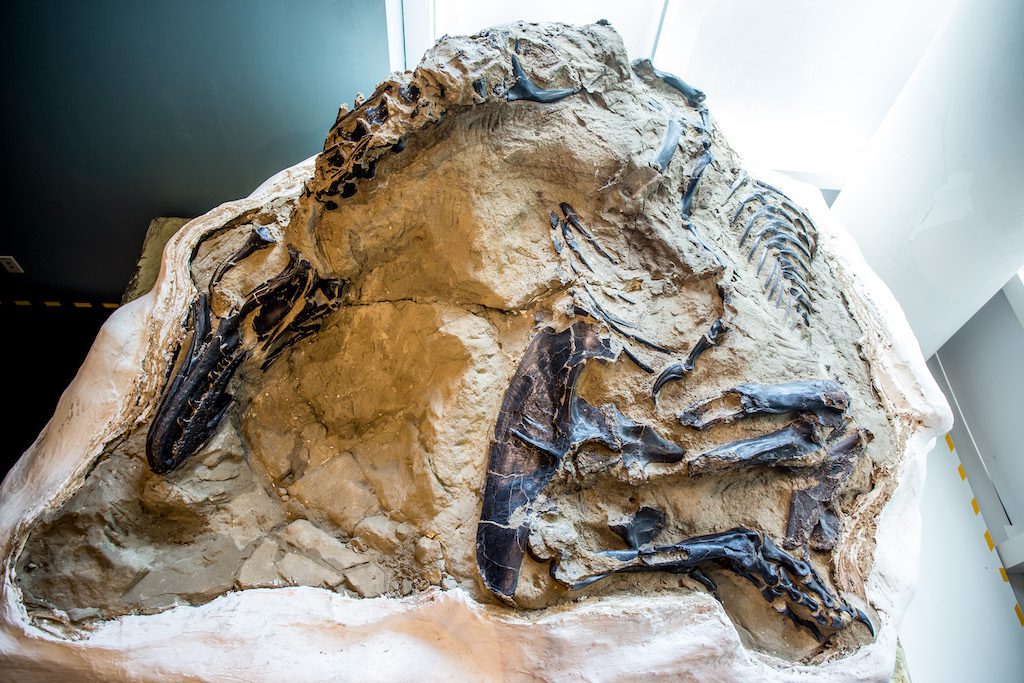First Complete T. Rex Skeleton

This is exciting: The first complete T. rex skeleton is unveiled at the North Carolina Museum of Natural Sciences: “The remains were uncovered about 10 years ago, but they’re estimated to be around 67 million years old. Zanno and the museum became involved around five years ago when their team first saw the specimens in a warehouse in Long Island, where they had gone to auction but not been sold. Zanno said this is the first time in known history that a T. rex has been 100% recovered. The Triceratops, too, is almost completely in its full form, and both specimens even contain skin impressions from the dinosaurs. ‘These specimens are pristine,’ she said. ‘Every bone is in its natural position as it was when the animal died.’” (HT: Alan Cornett)
In other news: P. J. O’Rourke reviews the latest Kennedy book: “In 2013, as the 50th anniversary of Kennedy’s assassination approached, the New York Times published an article by executive editor Jill Abramson. The Times—always standing ready at the eternal flame, Bic lighter in hand—titled the article ‘Kennedy, the Elusive President.’ Ms. Abramson wrote, in what I suppose she thought was a lament, ‘An estimated 40,000 books about him have been published since his death… and not one really outstanding one.’ Logevall’s is another. In his JFK and all the rest of these ‘not really outstanding’ books, the problem isn’t Kennedy’s elusiveness. The problem is our elusiveness about Kennedy. We don’t want to grasp and hold in our minds the reality of the man. Nor do we want to dwell on the fecklessness and mediocrity of his kith and kin.”
Rose Dugdale was a British heiress who wrote a thesis on Ludwig Wittgenstein with the recommendation of Iris Murdoch. She went on to become an art thief for the IRA. Katharine Weber reviews the book that tells her story in the Washington Post: “The Woman Who Stole Vermeer, Anthony M. Amore’s engrossing new book, is the first deep dive into the peculiar life of Rose Dugdale, the 33-year-old British heiress with a PhD who, at the time of her arrest, was also wanted for gunrunning, a bombing attempt and armed hijacking.”
The outsider art of Alfred Wallis: “The opportunity to rediscover Alfred Wallis (1855–1942), the self-taught artist and mariner, is timely. His outsider art increasingly seems not a side issue but a significant catalyst in the formation of the avant-garde in England during the late 1920s. Ben Nicholson and Christopher Wood, leading figures in the London-based group the Seven & Five Society along with Ben’s wife Winifred Nicholson, caught sight of his art by chance in 1928, on a day visit to St Ives while staying nearby in Cornwall. This story is often told.”
The hotel at the heart of the Hudson River School: “An unearthed guest register from the Catskill Mountain House sheds light on the artists who spent the night there.”
Matthew Stewart reviews How to Think like Shakespeare: “Scott Newstok has written a delightful book about modern education in the guise of a Shakespearean analysis. He succeeds in analyzing how the foremost genius of the literary stage came to acquire the habits of mind that propelled his brilliance. But his real objective is to argue that we should build a bridge to the sixteenth century and make those habits our own. How?”
A.S.H. Smyth reviews Shaun Bythell’s Seven Kinds of People You Find in Bookshops: “Bythell is the sort of chap who still makes references to radio programmes as though they’re common currency (his books then end up on R4, obviously, thus perpetuating this cycle), and laments the coming of the Amazon generation, ‘for whom the chase has no thrill.’ If I remember rightly, he once blew away a Kindle with a shotgun, making him the closest thing the bookshop world has to Hunter S Thompson.”
Photos: Kansas
Comments